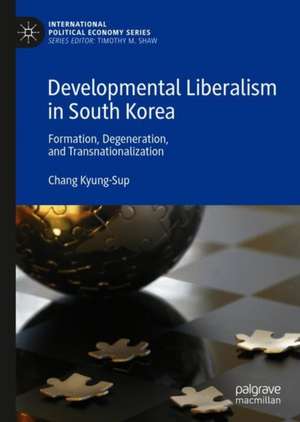Developmental Liberalism in South Korea: Formation, Degeneration, and Transnationalization: International Political Economy Series
Autor Chang Kyung-Supen Limba Engleză Hardback – 17 mai 2019
Din seria International Political Economy Series
- 9%
 Preț: 831.23 lei
Preț: 831.23 lei - 20%
 Preț: 751.82 lei
Preț: 751.82 lei - 17%
 Preț: 490.23 lei
Preț: 490.23 lei - 17%
 Preț: 363.47 lei
Preț: 363.47 lei - 20%
 Preț: 690.96 lei
Preț: 690.96 lei - 20%
 Preț: 627.54 lei
Preț: 627.54 lei - 9%
 Preț: 762.79 lei
Preț: 762.79 lei -
 Preț: 430.59 lei
Preț: 430.59 lei -
 Preț: 428.68 lei
Preț: 428.68 lei -
 Preț: 147.23 lei
Preț: 147.23 lei - 20%
 Preț: 566.63 lei
Preț: 566.63 lei -
 Preț: 385.08 lei
Preț: 385.08 lei -
 Preț: 389.11 lei
Preț: 389.11 lei - 15%
 Preț: 644.30 lei
Preț: 644.30 lei -
 Preț: 389.31 lei
Preț: 389.31 lei - 15%
 Preț: 644.30 lei
Preț: 644.30 lei -
 Preț: 413.84 lei
Preț: 413.84 lei -
 Preț: 387.38 lei
Preț: 387.38 lei - 15%
 Preț: 638.89 lei
Preț: 638.89 lei - 15%
 Preț: 644.63 lei
Preț: 644.63 lei - 18%
 Preț: 893.71 lei
Preț: 893.71 lei -
 Preț: 412.47 lei
Preț: 412.47 lei -
 Preț: 325.08 lei
Preț: 325.08 lei -
 Preț: 395.47 lei
Preț: 395.47 lei - 15%
 Preț: 641.85 lei
Preț: 641.85 lei -
 Preț: 391.40 lei
Preț: 391.40 lei -
 Preț: 388.34 lei
Preț: 388.34 lei - 15%
 Preț: 640.55 lei
Preț: 640.55 lei -
 Preț: 389.70 lei
Preț: 389.70 lei - 15%
 Preț: 646.30 lei
Preț: 646.30 lei - 15%
 Preț: 637.78 lei
Preț: 637.78 lei - 15%
 Preț: 643.84 lei
Preț: 643.84 lei -
 Preț: 386.99 lei
Preț: 386.99 lei - 15%
 Preț: 641.53 lei
Preț: 641.53 lei -
 Preț: 386.81 lei
Preț: 386.81 lei - 15%
 Preț: 639.73 lei
Preț: 639.73 lei - 18%
 Preț: 944.19 lei
Preț: 944.19 lei -
 Preț: 391.40 lei
Preț: 391.40 lei -
 Preț: 330.65 lei
Preț: 330.65 lei -
 Preț: 394.12 lei
Preț: 394.12 lei -
 Preț: 386.99 lei
Preț: 386.99 lei -
 Preț: 386.81 lei
Preț: 386.81 lei -
 Preț: 387.75 lei
Preț: 387.75 lei - 15%
 Preț: 634.68 lei
Preț: 634.68 lei -
 Preț: 392.60 lei
Preț: 392.60 lei - 15%
 Preț: 641.53 lei
Preț: 641.53 lei - 15%
 Preț: 640.06 lei
Preț: 640.06 lei - 15%
 Preț: 643.16 lei
Preț: 643.16 lei - 15%
 Preț: 642.68 lei
Preț: 642.68 lei - 15%
 Preț: 641.85 lei
Preț: 641.85 lei
Preț: 475.62 lei
Preț vechi: 559.55 lei
-15% Nou
Puncte Express: 713
Preț estimativ în valută:
91.01€ • 95.28$ • 75.30£
91.01€ • 95.28$ • 75.30£
Carte tipărită la comandă
Livrare economică 07-21 aprilie
Preluare comenzi: 021 569.72.76
Specificații
ISBN-13: 9783030145750
ISBN-10: 3030145751
Pagini: 238
Ilustrații: XXII, 221 p. 6 illus., 5 illus. in color.
Dimensiuni: 148 x 210 mm
Greutate: 0.54 kg
Ediția:1st ed. 2019
Editura: Springer International Publishing
Colecția Palgrave Macmillan
Seria International Political Economy Series
Locul publicării:Cham, Switzerland
ISBN-10: 3030145751
Pagini: 238
Ilustrații: XXII, 221 p. 6 illus., 5 illus. in color.
Dimensiuni: 148 x 210 mm
Greutate: 0.54 kg
Ediția:1st ed. 2019
Editura: Springer International Publishing
Colecția Palgrave Macmillan
Seria International Political Economy Series
Locul publicării:Cham, Switzerland
Cuprins
1. Introduction: Developmental Social Governance in Transition.- 2. Developmental Liberalism: The Developmental State and Social Policy.- 3. Coping with the “IMF Crisis” in the Developmental Liberal Context.- 4. Developmental Citizenry Stranded: Jobless Economic Recovery.- 5. Financialization of Poverty: Consumer Credit instead of Social Wage?.- 6. Demographic Meltdown: Familial Structural Adjustments to the Post-Developmental Impasse.- 7. From Developmental Liberalism to Neoliberalism.- 8. The Rise of Developmental Liberal Asia: South Korean Parameters of Asianized Industrial Capitalism.
Notă biografică
Chang Kyung-Sup is Professor of Sociology at Seoul National University, South Korea.
Textul de pe ultima copertă
“We are offered a refreshingly new and interdisciplinary take on social policy, one far from the straitjacket of the hegemonic welfare regime approach. This volume may not be the last word on the nature and determinants of South Korean social policy but it does offer an admirable lesson in how social policy should be studied.”
—Ben Fine, SOAS, University of London, UK
“As the world´s center is gravitating towards Asia, our ignorance of the pathways, mechanisms, and costs of its extraordinary recent development had better dwindle fast. Chang Kyung-Sup is arguably the best guide to understanding the complexity, the remarkable achievements, and the costs and contradictions of South Korea´s ‘developmental liberalism’ and of its resulting ‘compressed modernity.’”
—Göran Therborn, University of Cambridge, UK
—Ben Fine, SOAS, University of London, UK
“As the world´s center is gravitating towards Asia, our ignorance of the pathways, mechanisms, and costs of its extraordinary recent development had better dwindle fast. Chang Kyung-Sup is arguably the best guide to understanding the complexity, the remarkable achievements, and the costs and contradictions of South Korea´s ‘developmental liberalism’ and of its resulting ‘compressed modernity.’”
—Göran Therborn, University of Cambridge, UK
Chang Kyung-Sup is Professor of Sociology at Seoul National University, South Korea.
Caracteristici
Addresses developmental liberalism and developmental citizenship in the concrete historical context of South Korea’s developmental-to-neoliberal transition Discusses the consequences of the national economic crises, as well as the political parameters and aftermaths of the neoliberal transition Covers the pre-crisis, crisis, and post-crisis periods
